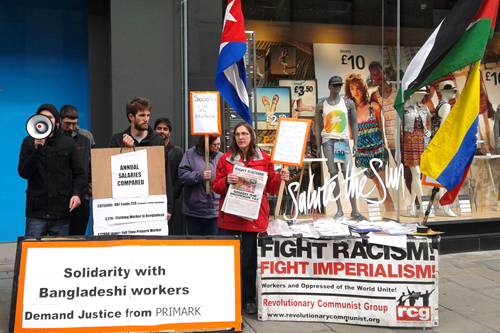
On 24 April, the collapse of garment factory near the Bangladeshi capital claimed the lives of more than 1,100 people, mainly young women, and injured over 2,500 in the country’s worst industrial accident ever. Reshma Begum, a 19-year old seamstress, was the last person to be pulled alive from the ruins, 17 days after the disaster, before the search for survivors was called off on 13 May and bulldozers sent in to clear the rubble. About 700 bodies have been returned to families; the government has buried the bodies of those who could not be identified and a makeshift morgue has been established in a nearby school to store another 100 or so bodies for DNA identification.
Numbers of those missing remain unclear since officials have been unable to verify how many people were actually in the Rana Plaza – a shoddily constructed building housing a bank, shopping centre and four textiles factories supplying Primark, Matalan, Mango and Benetton – at the time of collapse. When cracks started to appear on the morning of 24 April, building managers ordered a complete evacuation. However, while bank workers were told to stay out, factory staff were ordered to return to work or lose their jobs; some were threatened with beatings. Hours later, the building collapsed, in the world’s worst industrial accident since the Bhopal disaster in India in 1984.
Bangladeshi state officials are blaming the building’s owner, Sohel Rana, for developing the structure on swampy land and then illegally adding three floors to the building to install heavy machinery and generators. Rana was arrested on 28 April near the border of Bangladesh with India after going missing and is being held along with eight other people, including the owners of each factory inside the building. However, greedy, culpable and negligent as the owners maybe, they also provide easy scapegoats, allowing the root causes of the disaster and the systematic abuse and exploitation of Bangladesh’s garment workers to go unchallenged. The Bangladesh government is complicit with multinational clothing companies in a cavalier disregard for human rights, health and safety regulations and buildings standards, concerned only with feeding a market obsessed with cultivating more and more profit. On 9 May a fire ripped through the Tung Hai Sweater factory factory in Dhaka, killing eight people. Fortunately, the factory was closed, avoiding a repeat of the tragedy at the Tazreen factory in November last year* in which almost 120 people were killed. Such tragedies are a common occurrence in Bangladesh and highlight the glaring failures plaguing the country’s textile industry, the apathy in imperialist countries towards the exploitation of workers in more oppressed nations, and the lack of an organised movement able to push for improved standards. The demand by a European Union’s delegation to Bangladesh that the government ‘act immediately’ to improve working conditions in the country’s garment industry are empty words when profit is king.
However, such was the public outrage worldwide at the sheer scale of the Rana Plaza disaster, that for the first time both the government and international clothing companies have had to make some concessions. The Bangladeshi government has announced that it will ‘review’ a tiny raise on the minimum wage of 3,000 Taka (about £25 a month), while the biggest European purchasers of garments produced in Bangladesh, including Mothercare, Next, Primark, Tesco, Inditex (owners of Zara) and H&M, rushed to sign up to the newly-introduced and legally binding Accord on Fire and Building Safety in Bangladesh, which aims to improve safety conditions within factories in the country.. Primark pledged ‘to put in place immediate and long-term help for victims of this disaster’: the Bangladeshi High Commissioner to London, Mohamed Mijarul Quayes, responded by saying: ‘Primark has led by example…there is not an obligation to do so, but it speaks of the high moral ground.’ (In the week of the collapse, shares in Primark’s parent company, Associated British Foods, rose by 6.5%.) However, US companies Gap, Sears and Walmart, owners of the ASDA chain of supermarkets in Britain, have refused to sign up, citing the accord’s lack of clarity on the consequences companies will face if found to have breached it as a deal-breaker, with Gap demanding changes to its provisions on dispute resolution. The Accord lasts for five years and sets out guidelines for the whole industry including training, governance of factories, transparency, supplier incentives, complaints processes and financial support and can lead to legal action for breaches.
The impact of the accord remains to be seen. Its opening lines establish that it has as its goal:
‘a safe and sustainable Bangladeshi Ready-Made Garment (“RMG”) industry in which no worker needs to fear fires, building collapses, or other accidents that could be prevented with reasonable health and safety measures’. For this to become a reality, consumers must build pressure against the imperialists who line their pockets off the backs of the suffering of workers. No longer should the drive to make vast profits from ever-cheaper clothing be allowed to cheapen the lives of the impoverished.
Nazia Mukti




